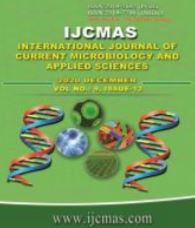


 National Academy of Agricultural Sciences (NAAS)
National Academy of Agricultural Sciences (NAAS)

|
PRINT ISSN : 2319-7692
Online ISSN : 2319-7706 Issues : 12 per year Publisher : Excellent Publishers Email : editorijcmas@gmail.com / submit@ijcmas.com Editor-in-chief: Dr.M.Prakash Index Copernicus ICV 2018: 95.39 NAAS RATING 2020: 5.38 |
Herbicides use is increasing throughout the globe due to increasing labour cost, choice of application of herbicides, quick weed control in crop and non-cropped areas. Even though the persistence of pendimethalin may be shorter, depends upon the soil, weather and the crop for which its applied will vary in the pendimethalin residues. Hence, pot culture experiments have been carried out with an objective to evaluate various organics and bioagents for their efficiency to degrade the pendimethalin residues faster in the soil. Soil samples were analysed for pendimethalin residues. Residues of pendimethain were extracted using methanol and determined by High Performance Liquid Chromatography (HPLC). It was found that the dissipation was faster under Farm yard manure (FYM), Arbuscular Mycorrhiza (AM) and biochar applied treatments and the slowest degradation was noticed in control during both the years. The lowest half life of 8.57 days (2018-19) and 8.32 days (2019-20) was observed in farm yard manure applied treatment. Application of farm yard manure at 10 t ha-1 or vermicompost at 5 t ha-1 is efficient in reducing the residual concentration of pendimethalin in green gram grown soil. Irrespective of the treatments the pendimethalin residues persisted up to 45 DAHA. On 60 DAHA residues became BDL in FYM and vermicompost applied treatments when compared to others
 |
 |
 |
 |
 |